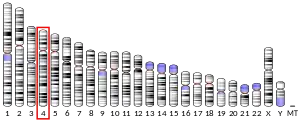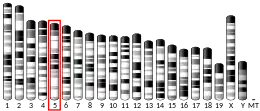SEPSECS
O-phosphoseryl-tRNA(Sec) selenium transferase is an enzyme that in humans is encoded by the SEPSECS gene.[5][6][7][8][9]
| SEPSECS | |||||||||||||||||||||||||||||||||||||||||||||||||||
|---|---|---|---|---|---|---|---|---|---|---|---|---|---|---|---|---|---|---|---|---|---|---|---|---|---|---|---|---|---|---|---|---|---|---|---|---|---|---|---|---|---|---|---|---|---|---|---|---|---|---|---|
| |||||||||||||||||||||||||||||||||||||||||||||||||||
| Identifiers | |||||||||||||||||||||||||||||||||||||||||||||||||||
| Aliases | SEPSECS, LP, PCH2D, SLA, SLA/LP, Sep (O-phosphoserine) tRNA:Sec (selenocysteine) tRNA synthase, soluble liver antigen, SecS | ||||||||||||||||||||||||||||||||||||||||||||||||||
| External IDs | OMIM: 613009 MGI: 1098791 HomoloGene: 15031 GeneCards: SEPSECS | ||||||||||||||||||||||||||||||||||||||||||||||||||
| |||||||||||||||||||||||||||||||||||||||||||||||||||
| |||||||||||||||||||||||||||||||||||||||||||||||||||
| |||||||||||||||||||||||||||||||||||||||||||||||||||
| |||||||||||||||||||||||||||||||||||||||||||||||||||
| |||||||||||||||||||||||||||||||||||||||||||||||||||
| Wikidata | |||||||||||||||||||||||||||||||||||||||||||||||||||
| |||||||||||||||||||||||||||||||||||||||||||||||||||
References
- GRCh38: Ensembl release 89: ENSG00000109618 - Ensembl, May 2017
- GRCm38: Ensembl release 89: ENSMUSG00000029173 - Ensembl, May 2017
- "Human PubMed Reference:". National Center for Biotechnology Information, U.S. National Library of Medicine.
- "Mouse PubMed Reference:". National Center for Biotechnology Information, U.S. National Library of Medicine.
- Xu XM, Mix H, Carlson BA, Grabowski PJ, Gladyshev VN, Berry MJ, Hatfield DL (Dec 2005). "Evidence for direct roles of two additional factors, SECp43 and soluble liver antigen, in the selenoprotein synthesis machinery". J. Biol. Chem. 280 (50): 41568–75. doi:10.1074/jbc.M506696200. PMID 16230358.
- Costa M, Rodríguez-Sánchez JL, Czaja AJ, Gelpí C (Aug 2000). "Isolation and characterization of cDNA encoding the antigenic protein of the human tRNP(Ser)Sec complex recognized by autoantibodies from patients with type-1 autoimmune hepatitis". Clin. Exp. Immunol. 121 (2): 364–74. doi:10.1046/j.1365-2249.2000.01280.x. PMC 1905695. PMID 10931155.
- Yuan J, Palioura S, Salazar JC, Su D, O'Donoghue P, Hohn MJ, Cardoso AM, Whitman WB, Söll D (Dec 2006). "RNA-dependent conversion of phosphoserine forms selenocysteine in eukaryotes and archaea". Proc. Natl. Acad. Sci. U.S.A. 103 (50): 18923–7. Bibcode:2006PNAS..10318923Y. doi:10.1073/pnas.0609703104. PMC 1748153. PMID 17142313.
- Xu XM, Carlson BA, Mix H, Zhang Y, Saira K, Glass RS, Berry MJ, Gladyshev VN, Hatfield DL (Apr 2007). "Biosynthesis of selenocysteine on its tRNA in eukaryotes". PLOS Biol. 5 (1): e4. doi:10.1371/journal.pbio.0050004. PMC 1717018. PMID 17194211.
- "Entrez Gene: SLA/LP soluble liver antigen/liver pancreas antigen".
Further reading
- Herkel J, Heidrich B, Nieraad N, Wies I, Rother M, Lohse AW (2002). "Fine specificity of autoantibodies to soluble liver antigen and liver/pancreas". Hepatology. 35 (2): 403–8. doi:10.1053/jhep.2002.30699. PMID 11826415. S2CID 46400743.
- Volkmann M, Martin L, Bäurle A, Heid H, Strassburg CP, Trautwein C, Fiehn W, Manns MP (2001). "Soluble liver antigen: isolation of a 35-kd recombinant protein (SLA-p35) specifically recognizing sera from patients with autoimmune hepatitis". Hepatology. 33 (3): 591–6. doi:10.1053/jhep.2001.22218. PMID 11230739. S2CID 11978013.
- Wies I, Brunner S, Henninger J, Herkel J, Kanzler S, Meyer zum Büschenfelde KH, Lohse AW (2000). "Identification of target antigen for SLA/LP autoantibodies in autoimmune hepatitis". Lancet. 355 (9214): 1510–5. doi:10.1016/S0140-6736(00)02166-8. PMID 10801173. S2CID 45159673.
This article is issued from Wikipedia. The text is licensed under Creative Commons - Attribution - Sharealike. Additional terms may apply for the media files.



